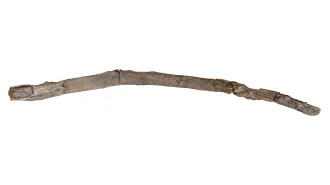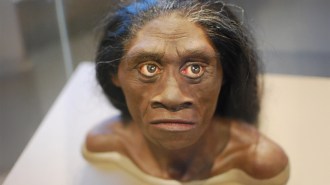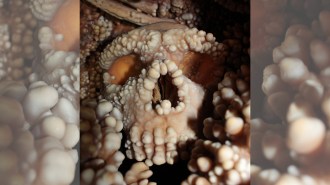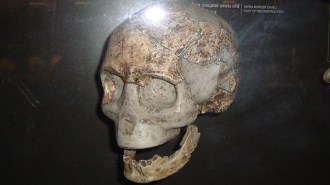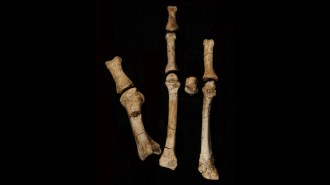Evolution’s Lost Bite: Gene change tied to ancestral brain gains
A genetic loss approximately 2.4 million years ago may have made cranial room for the bigger brains that characterize our direct evolutionary predecessors. That proposal comes from researchers who have discovered a DNA deletion that occurs in people but not in other primates.
In what started out as a search for genes linked to muscular dystrophy, a team led by surgeon Hansell H. Stedman of the University of Pennsylvania School of Medicine in Philadelphia found that only people possess an inactivated version of a gene involved in facial-muscle movements. As a result, the gene fails to produce a variant of the protein, called myosin, that powers muscles used in biting and chewing, the scientists report in the March 25 Nature.
This genetic mutation explains much about why “we’re the odd men out among primates regarding head shape,” Stedman says. As a person grows, he argues, genetically constrained chewing muscles lead to relatively small jaws, thus permitting the deposition of additional cranial bone to encase a large brain.
After examining a segment of the particular myosin gene in people, chimpanzees, orangutans, macaque monkeys, and dogs, the researchers estimated that the gene-inactivating mutation occurred between 2.7 and 2.1 million years ago. To make this calculation, the researchers assumed, on the basis of prior molecular evidence, that the last common ancestor of people and chimps lived 7 million to
6 million years ago.
“Massive muscles of mastication that were present before this myosin-gene mutation occurred could have been constraining brain size by limiting the expansion of [cranial] plates in the developing skull,” says University of Pennsylvania School of Medicine anatomist Nancy Minugh-Purvis, a coauthor of the new study.
The myosin-gene mutation appeared uniformly in DNA samples obtained by the investigators from people living in Africa, South America, Western Europe, Iceland, Japan, and Russia. The corresponding myosin gene in chimps, gorillas, orangutans, and macaques was intact and active.
The researchers determined that, in macaques, the protein made by this myosin gene appeared only in head muscles primarily used for chewing and biting.
In both macaques and people, myosin-gene products appeared only in a class of muscle fibers known as fast-twitch fibers. Mastication muscles contain mostly fast-twitch fibers, with a smaller proportion of slow-twitch fibers, Stedman says.
Other scientists welcome evidence of the mutated myosin gene but doubt that the mutation is linked to brain expansion in our ancient ancestors.
“[Stedman’s team] used good genetic data to create an implausible evolutionary story,” remarks developmental biologist Melanie McCollum of Mercer University School of Medicine in Macon, Ga. It’s more likely that the inactivating myosin mutation became common as our ancestors began to eat primarily soft foods, McCollum proposes.
Since brain growth proceeds independently of jaw and tooth development in people today, “there’s no reason to assume that the evolution of smaller mastication muscles had any effect on braincase size,” McCollum holds.
Harvard University anthropologist Daniel Lieberman agrees, noting that brain growth follows a similarly autonomous path in chimps and gorillas.
Anthropologist C. Owen Lovejoy of Kent (Ohio) State University adds another objection. Drawing on the most recent fossil evidence, he says that chimps and humans began diverging between 9 million and 8 million years ago. If so, he says, Stedman’s estimated timing of the mutation at 2.4 million years ago is much too recent.


